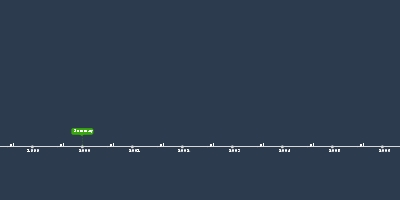1 janv. 1977 - Focus on the Family founded
Description:
national review: A conservative magazine founded by editor William F. Buckley in 1955 that criticized liberal policy and helped lay the foundation for the New Right.religious right: Politically active religious conservatives, especially Catholics and evangelical Christians, who became particularly vocal in the 1980s against feminism, abortion, and homosexuality and who promoted “family values.”
Several additional developments within the New Right completed Reagan’s rise. The burgeoning conservative movement increasingly resembled a three-legged stool. Each leg represented an ideological position and its political constituency: anticommunism, free-market economics, and religious traditionalism. Uniting all three into a political coalition was not simple. Traditionalists demanded strong government action to implement their faith-based agenda, but economic conservatives favored limited government and free markets. Both groups, however, were ardent anticommunists — free marketeers loathed the state-directed Soviet economy, and religious conservatives opposed the “godless” secularism of the Soviet state. The success of the New Right would come to depend on a balancing of cultural, economic, and political interests.
Beginning in the 1950s, conservative intellectuals worked to build an ideological foundation that would eventually support the New Right. Particularly prominent in this effort were William F. Buckley, the founder and editor of the conservative magazine National Review, and Milton Friedman, the Nobel Prize–winning economist at the University of Chicago. Convinced that “the growth of government must be fought relentlessly,” Buckley used the National Review to criticize liberal policy. For his part, Friedman became a national conservative icon with the publication of Capitalism and Freedom (1962), in which he argued that “economic freedom is … an indispensable means toward the achievement of political freedom.” Friedman’s free-market ideology, along with that of Friedrich von Hayek, another University of Chicago economist, found favor with wealthy conservatives, who funded think tanks during the 1980s to disseminate market-based public policy ideas. Groups such as the Heritage Foundation, the American Enterprise Institute, and the Cato Institute issued policy proposals and attacked liberal legislation they saw as strangling economic freedom. Followers of Buckley and Friedman envisioned themselves as crusaders working against what one conservative called “the despotic aspects of egalitarianism.”
The Religious Right completed the conservative coalition. Until the 1970s, politics was an earthly concern of secondary interest to most fundamentalist and evangelical Protestants. But the perception that American society had become immoral, combined with the influence of a new generation of popular ministers, fostered a more urgent approach. Conservative Protestants and Catholics joined together in a tentative alliance to condemn divorce, abortion, premarital sex, and feminism. The route to a moral life and to “peace, pardon, purpose, and power,” as one evangelical activist said, was “to plug yourself into the One, the Only One [God].”
Charismatic televangelists such as Pat Robertson and Jerry Falwell emerged as the champions of a morality-based political agenda during the late 1970s. Falwell, founder of Liberty University and host of the Old Time Gospel Hour television program, established the Moral Majority in 1979. With 400,000 members and $1.5 million in contributions in its first year, this group would become the organizational vehicle for transforming the new evangelicalism into a religious political movement. Falwell made no secret of his views: “If you want to know where I am politically,” he told reporters, “I thought Goldwater was too liberal.” Falwell was not alone. Phyllis Schlafly’s STOP ERA, which became Eagle Forum in 1975, continued to advocate for conservative public policy; Focus on the Family, which emphasized healthy marriages and opposed gay rights, was founded in 1977; and a succession of conservative organizations would emerge in the 1980s, including the Family Research Council, which would become one of the leading national voices for traditional marriage and family.
Television evangelist Pat Robertson speaks before supporters at Constitution Hall, declaring God made his decision and that he is ready to run for president as soon as 3 million voters agree to pray and pay for his campaign. Robertson symbolized the rise of Christian conservatives in American politics during the 1980s.
In 1964, voters had decidedly rejected the conservative message preached by Goldwater, choosing the liberal Democratic agenda instead. Then came a series of events that undermined support for liberalism: the failed war in Vietnam; urban riots; a judiciary that legalized abortion, tolerated pornography, enforced school busing, and curtailed public expression of religion; and a stagnating economy on top. By the late 1970s, the New Right had refined a conservative message with broader appeal than Goldwater’s program. Religious and free-market conservatives joined with anticommunist hard-liners — alongside whites opposed to black civil rights, affirmative action, and busing — in a broad coalition that attacked welfare-state liberalism, social permissiveness, and a foreign policy deemed weak. In winning the 1980 Republican presidential nomination, Ronald Reagan expertly appealed to all of these constituencies (see “Firsthand Accounts”). It had taken almost two decades, but the New Right was on the threshold of power.
Ajouté au bande de temps:
Date:
1 janv. 1977
Maintenaint
~ Il y a 48 ans
